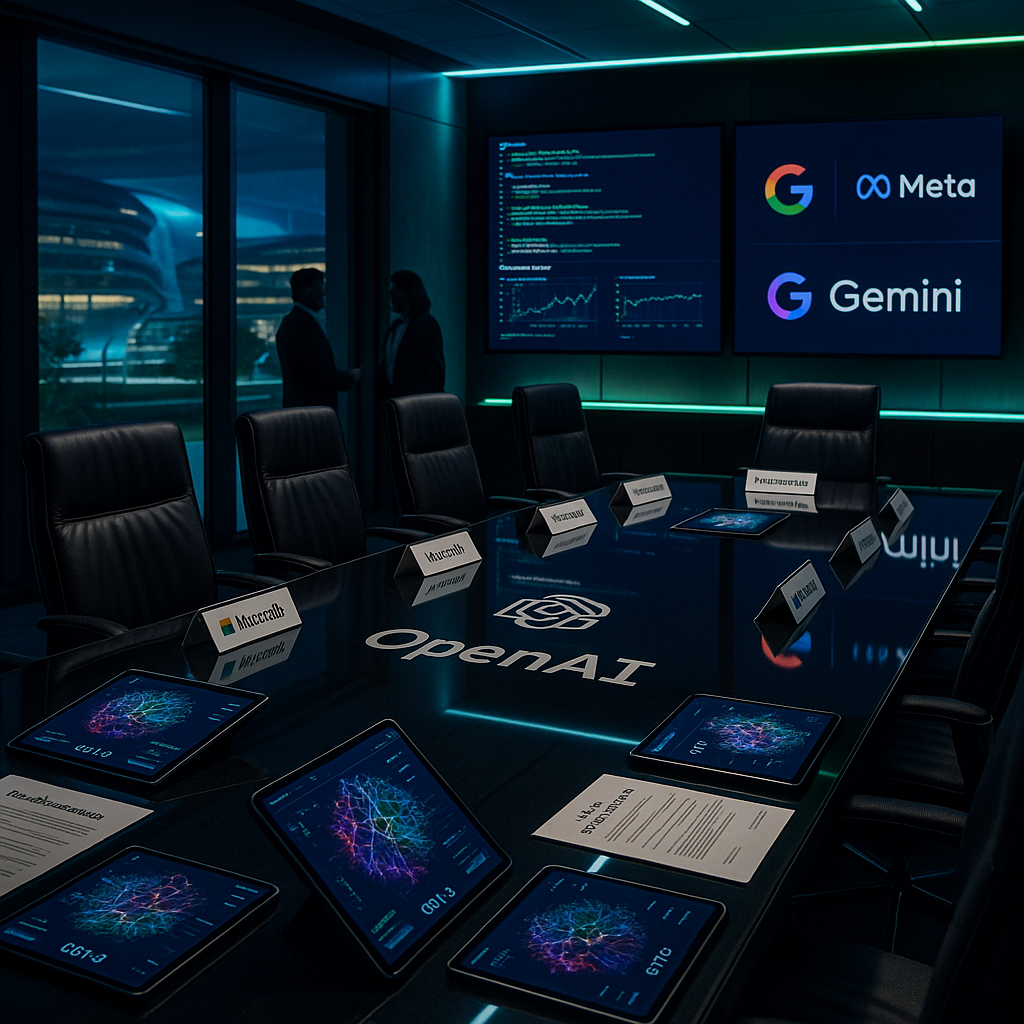Key Takeaways
- Top story: OpenAI expands ChatGPT Search to all users at no cost, now including mobile device support.
- Microsoft commits $4 billion to AI education initiatives over the next five years.
- Microsoft 365 Copilot surpasses 100 million monthly active users, indicating rapid workplace AI adoption.
- Intel reports slower AI chip sales, attributing delays to ongoing software challenges.
- The tech news press review highlights intensifying competition among AI leaders as accessibility broadens.
Introduction
On 1 November 2025, today’s tech news press review covers OpenAI’s expansion of ChatGPT Search, now free for all users and available on mobile devices. This roundup also examines Microsoft’s $4 billion investment in AI education and explores how major technology companies are influencing the digital landscape.
Top Story
OpenAI Announces Leadership Overhaul
OpenAI has unveiled a major leadership restructuring, dissolving its previous board and appointing seven new directors. The announcement was made during a virtual press conference. CEO Sam Altman stated that the changes aim to “strengthen governance and oversight” following months of internal discussions about the company’s direction.
The new board includes three independent technology executives, two AI ethics specialists, and two representatives from Microsoft, OpenAI’s largest investor. This is the first time Microsoft has formal board representation, indicating a deeper integration between the two organizations.
Altman explained that the restructuring seeks to balance commercial interests with OpenAI’s original safety mission. He stated, “We’re creating a governance structure that can better navigate the unprecedented challenges of building increasingly powerful AI systems.”
Un passo avanti. Sempre.
Unisciti al nostro canale Telegram per ricevere
aggiornamenti mirati, notizie selezionate e contenuti che fanno davvero la differenza.
Zero distrazioni, solo ciò che conta.
 Entra nel Canale
Entra nel Canale
Strategic Implications
These leadership changes come as OpenAI prepares to launch GPT-6. The upcoming release is expected to be its most sophisticated model to date. Industry experts interpret the board reorganization as preparation for the increased responsibility and scrutiny that will come with advanced AI developments.
Microsoft’s formal role on the board reflects its $13 billion investment and reinforces its strategic partnership with OpenAI. Microsoft’s Azure platform continues as the exclusive infrastructure provider for OpenAI’s services.
The restructuring also addresses tensions between OpenAI’s nonprofit origins and its expanding commercial ambitions. Two of the new board members bring experience from nonprofit AI safety organizations, indicating efforts to rebalance these priorities.
EU AI Act is also shaping how major players strategize around compliance and responsible innovation.
Also Today
Google Accelerates Gemini Development
Google has fast-tracked the timeline for its next-generation Gemini AI model, now set for release in December 2025. Internal documents indicate the company has doubled the computing resources for training the new system.
This updated schedule appears in direct response to OpenAI’s leadership changes and the imminent release of GPT-6. CEO Sundar Pichai noted during a quarterly earnings call that “the pace of AI innovation demands that we move with unprecedented speed.”
Analysts observe that Google’s AI team has been restructured to focus on multimodal capabilities, integrating text, image, and audio understanding. The company reportedly hired 200 additional AI researchers during the past quarter.
multimodal capabilities are becoming central in the competitive race among AI leaders.
Meta Launches Open-Source LLM Initiative
Meta has introduced a new open-source large language model initiative called “Foundation Framework.” The program offers resources, tools, and documentation to help developers create and deploy customized AI models independently of proprietary platforms.
CEO Mark Zuckerberg presented the initiative at a developer conference, emphasizing that “AI’s future should be shaped by many hands, not just a few companies.” The program includes $50 million in grants for academic researchers and startups dedicated to responsible AI development.
Meta’s approach contrasts with OpenAI’s more closed ecosystem, marking a strategic divergence in how major technology companies approach AI creation and commercialization.
Also Today
EU AI Act Implementation Timeline Announced
The European Commission has published the official implementation schedule for the EU AI Act, with core provisions coming into effect on 2 February 2026. The initial phase introduces transparency requirements for general-purpose AI systems, followed by stricter rules for high-risk applications six months later.
Technology companies now have 14 months to prepare for the world’s most comprehensive AI regulatory framework. A dedicated AI Office with 85 staff members will oversee implementation and enforcement.
European Commissioner for Internal Market Thierry Breton stated that the timeline seeks to balance innovation and governance. “Europe is setting the global standard for trustworthy AI without stifling technological progress,” Breton commented during a press event in Brussels.
As compliance deadlines approach, companies are also assessing their approach to quantum computing and next-generation algorithms that intersect with regulatory requirements.
US Senate Committee Advances AI Disclosure Bill
The US Senate Commerce Committee has approved the AI Disclosure and Transparency Act with bipartisan support, advancing it to the full Senate. This bill would require companies to clearly label AI-generated content and maintain detailed records of training data sources.
Un passo avanti. Sempre.
Unisciti al nostro canale Telegram per ricevere
aggiornamenti mirati, notizie selezionate e contenuti che fanno davvero la differenza.
Zero distrazioni, solo ciò che conta.
 Entra nel Canale
Entra nel Canale
The legislation represents the most significant federal AI regulatory proposal to date in the United States. If enacted, it would establish baseline transparency requirements while leaving broader regulation to specialized agencies.
Committee chair Senator Maria Cantwell said, “This bill represents a targeted approach to ensuring consumers know when they’re interacting with AI while supporting continued American innovation in this crucial technology.”
What to Watch
- OpenAI Developer Conference (15–17 November 2025): OpenAI will share updates on API access policies and provide a preview of GPT-6 capabilities at its annual event in San Francisco.
- EU AI Act First Compliance Deadline (2 February 2026): Technology companies must meet initial transparency requirements for general-purpose AI in the European Union.
- Congressional Hearings on AI Regulation (3–4 December 2025): The US House Committee on Science, Space, and Technology will hold hearings on developing a national AI strategy.
- Google I/O Developer Conference (12–14 May 2026): Google is anticipated to officially launch Gemini and present integration plans across its product portfolio.
For a global view of how technology is changing, see key tech trends for 2025 that are influencing innovation timelines.
Conclusion
Today’s tech news press review demonstrates that OpenAI’s board transformation and Microsoft’s deepening partnership signal a pivotal evolution in AI governance. Major industry competitors are responding with accelerated product timelines and open-source innovation. International regulatory frameworks are advancing, setting up 2026 as a landmark year for compliance and transparency. What to watch: OpenAI’s upcoming developer conference, key EU AI Act deadlines, and scheduled US congressional hearings on AI regulation.
For strategies on adapting to upcoming digital changes, explore how experts are embracing a digital declutter to maintain focus and resilience in the fast-moving tech landscape.





Leave a Reply